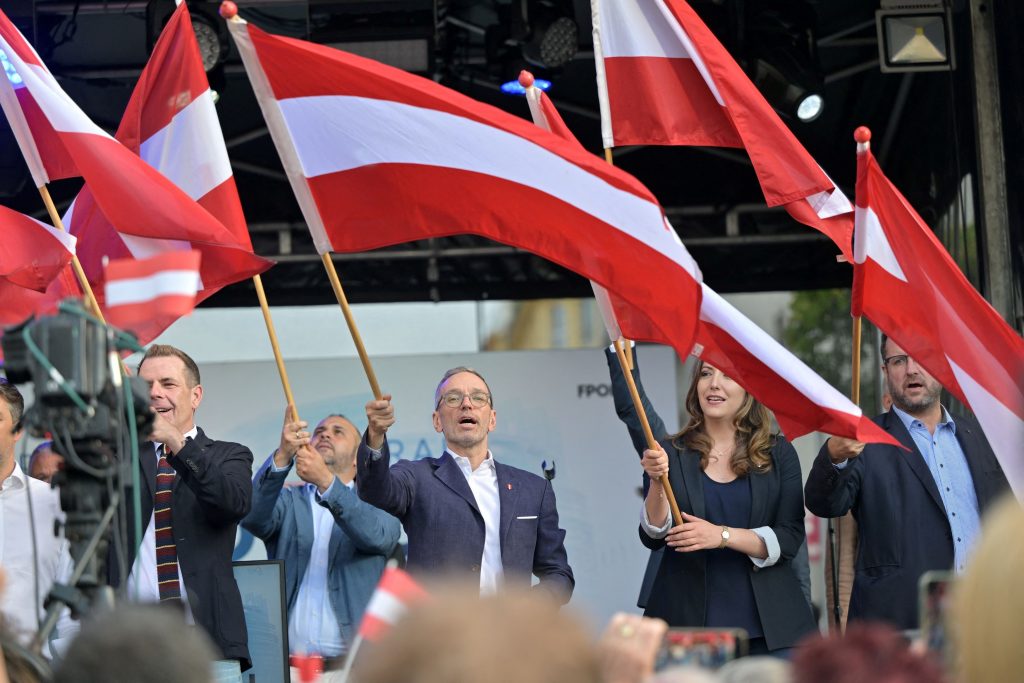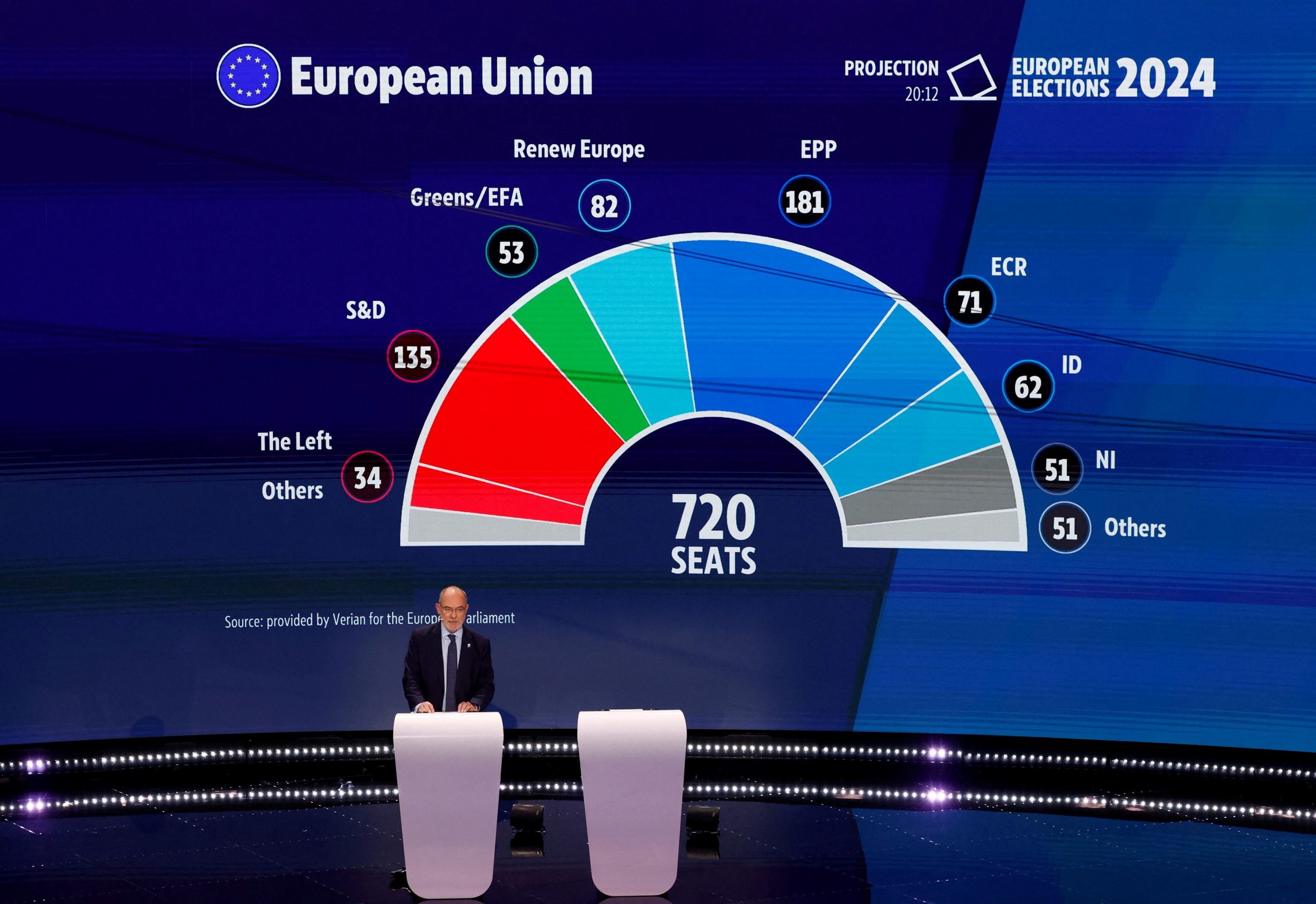The right-of-center to far-right parties across Europe appear to be the biggest winners on Sunday in European Parliament (EU Elex) elections held in 20 member-states, with European voters’ concerns over high cost-of-living, the ongoing war in Ukraine and tepid growth after the pandemic deemed as driving factors.
Nevertheless, one “elephant in the room” appears to be growing discontent and insecurity around Europe, especially in major cities, with migration flows – of both registered asylum seekers from non-EU countries and illegal migration – cited in major media accounts as an influencing factor in the vote albeit usually bundled along with other issues.
EPP
Parties affiliated with the center-right European People’s Party (EPP) grouping in the European Parliament were leading in Austria, Cyprus, Germany, Greece and the Netherlands, according to DW, which cited exit polls after the end of voting on Sunday.
The EPP grouping could pool approximately 180 of the 720 seats in the new plenum, something DW calls a “stable result compared with the 2019 election results,” and serves as a fillip for incumbent Commission President Ursula von der Leyen’s re-election bid.
In a ToVima report from Brussels, European Parliament President Roberta Metsola, who hails from the EPP grouping, presented results showing that the latter will actually pick up 181 seats, compared to the Socialists’ 135; 82 for Renew Europe and 53 for the slumping Greens/EFA.
According to projection results for the #EUElections2024, the conservative European People’s Party (EPP) will take the highest number of seats – 181.
The progressive Socialists and Democrats group (S&D) will take 135 seats and the centrist Renew Europe group 82 seats. pic.twitter.com/4blyv7FPsC
— euronews (@euronews) June 9, 2024
DW’s echoes the previous forecast, as second-place, in terms of representation, will be held by the center-left Social Democrats, who are forecast to pick up around 135 seats, followed by the Emmanuel Macron-backed liberal Renew, which DW reported as falling to between 81 and 87 seats in the new European Parliament.
Conversely, the far-right Identity & Democracy (ID) grouping, which includes Marine Le Pen’s backed party, is projected at 70 seats, less than the euro-sceptic European Conservatives and Reformists (ECR) grouping, at just under 80 seats.
The far-right Alternative for Germany (AfD) is considered as among the non-attached parties, as it was excluded from the ID group shortly before the EU elections.
Germany
In Germany, in particularly, all three parties in German Chancellor Olaf Scholz’s coalition saw support decline on Sunday, as all three – according to afp – fell behind the conservatives and the far right, as based on exit poll results.

Members of the Social Democratic Party (SPD) react to results after the polls closed in the European Parliament elections, in Berlin, Germany, June 9, 2024. REUTERS/Christian Mang
Scholz’s coalition-leading Social Democrats posted their worst-ever result at 14%, trailing the ultra-nationalist and anti-immigration AfD, which earned an unpreceded 16 to 16.5 percent, and well behind the conservative CDU-CSU bloc’s 29.5 percent, according to the polls published by national broadcasters ARD and ZDF.
Scholz’s coalition partners Greens earned 12-12.5 percent, while the liberal FDP picked up five percent.
France
In Europe’s other major power, France, the Guardian reported that the far right was making an impressive showing and leaving Macron’s allies in a not-so-close second place.
Specifically, the far-right National Rally, led by Jordan Bardella, was projected at 32.4%, followed by the Renaissance, Modem, Horizons, UDI party, led by Valérie Hayer, at 15.2%. The Socialists and Place Publique, led by Raphaël Glucksmann, was projected at 14.3%.

French Jordan Bardella, President of the French far-right National Rally (Rassemblement National – RN) party and head of the RN list for the European elections, gestures as he addresses party members after the polls closed during the European Parliament elections, in Paris, France, June 9, 2024. REUTERS/Sarah Meyssonnier
According to a Reuters dispatch, “Le Pen and her 28-year-old lead candidate, the increasingly popular Jordan Bardella, had sought to frame the EU election as a mid-term referendum on Macron’s mandate, tapping into discontent with immigration, crime and a two-year inflation crisis.
Le Pen’s party trounces Macron’s in EU vote – exit polls https://t.co/FHeF0zzTXz pic.twitter.com/NW8GtJfkkp
— Reuters (@Reuters) June 9, 2024
Le Pen’s strong showing will weaken Macron’s hold on power three years before the end of his final term, could prompt long-shot calls for early French elections but also fires the starting gun in his own camp on the race to succeed him.”
Austria
In Austria, another closely watched country, exit polls have the far-right Freedom Party, FPÖ, in first place with 27%, even ahead of the conservative People’s Party (ÖVP), who is forecast at 23.5%, and the Social Democrats (SPÖ) with 23%.
According to the BBC, the development marks the first time the FPÖ has come in first place in a nationwide election in Austria. It suggests a dramatic change of fortune for the party.

Austrian head of Freedom Party (FPOe) Herbert Kickl and candidate for the EU election Harald Vilimsky attend a campaign rally in Vienna, Austria, June 7, 2024. REUTERS/Elisabeth Mandl
The BBC attributes the gains to voter discontent with the pandemic measures, rising cost of living and concerns about the war in Ukraine.
Austria, Belgium, Bulgaria, Croatia, Cyprus, Denmark, Estonia, Finland, France, Germany, Greece, Hungary, Lithuania, Luxembourg, Poland, Portugal, Romania, Slovenia, Spain and Sweden are holding elections on Sunday.
Some 373 million citizens from 27 EU countries are eligible to vote in the EU elex.
🌀 Estimations France entière – Résultats à l’élection européenne – 20h – @IfopOpinion–@Fiducial pour @TF1, @LCI et @Le_Figaro
RN : 32,4%
Renaissance : 15,2%
PS : 14,3%
LFI : 8,3%
LR : 7%
Les Ecologistes : 5,6%
Reconquête ! : 5,1% pic.twitter.com/HRCztR7oul— Ifop Opinion (@IfopOpinion) June 9, 2024



